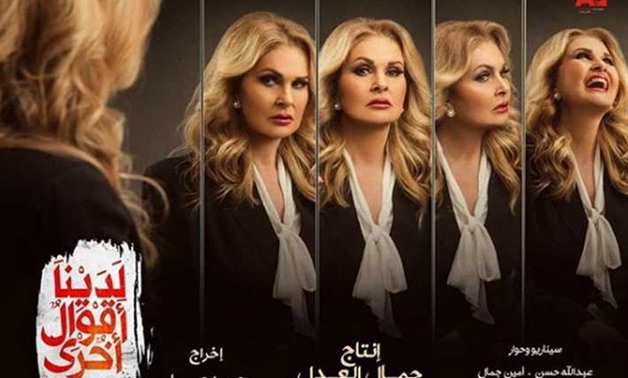
FILE - “Ladayna Aqwal Okhra” poster
CAIRO – 27 June _ 2018: If you are an avid follower of Yusra, then you know what to expect of her shows and the exact outline of the soap opera; therefore, you start watching without high expectation and little disappointments.
Anyone who has watched Yusra’s series will know their systematic three-stage development. The first stage is the “nice, wronged and downtrodden” Yusra, who then, in the second stage, becomes a weird and out-of-character persona. The final stage of the series is when the actress suddenly decides to step up and take charge of her predicament and regains control of her life. This is precisely the development of the character of Amira, the judicial figure in “Ladayna Aqwal Okhra”.
Directed by Muhammad Ali and written by Amin Jamal, “Ladayna Aqwal Okhra” hit the headlines and was the talk of social and audio/visual media before it was even aired for reasons unrelated to the actual content of the soap but due to its theme/opening credit song. The controversial choice of Fadel Shaker by the production company caused an uproar that resulted in the singer being suddenly dropped after the song was released on YouTube.
Al Adl Group continued their Ramadan tradition of working with the likes of Nelly Kareem and Yusra, which makes one ask why they continue doing so. Should a production company not experiment and work with different stars every year? Otherwise, such production companies fall into the trap of repetitive production, a notion that is certainly evident from Al Adl's Group collaboration with Yusra in the past few years.
“Ladayna Aqwal Okhra” is a tale of corruption and power, exploiting media and technology to serve one's personal gains. In it, we find Amira, played by Yusra, dragged into that world by coincidence when she hits a young man with her car and takes him to hospital, only to be told later that there was no accident and that no one was injured — hence, the main character begins her journey in solving this mystery. Yusra is not alien to the role of being a mother, and she does excel at it, as you can feel her warmth and love for her children, Fatema (Salma Abu Dief) and Ali (Ahmed Hatem), while she is still grieving for her other son who died in a car accident.
No one can fault the acting of Yusra, as her acting ability and long history speaks volumes. The problem is with the script and the way the character of Amira is portrayed as an angelic figure who, after being served the death penalty, suddenly turns into this super human who manages to dodge the police as she travels from one place to another, even daring to go home and see her children and friends. She even ventures into her enemies’ homes and threatens them, all without a single police officer catching her. The last few episodes of the series felt like they were either too rushed, presumably to meet the deadline of that magical 30 episode or they were written by a different team, as they were far-fetched and clichéd: the protagonist wins, and the antagonist is exposed and everyone turns against them.
The most positive feature of “Ladayna Aqwal Okhra” is undoubtedly the superb acting of Shereen Reda, who was very convincing as the power hungry and corrupt Malak Al Badrawi. This Ramadan, we saw so many actors and actresses play that evil character role each with their own touch and style, but none as believable as Reda's portrayal of Malak — her classy and chic appearance, combined with her firm but calm manner, made her the perfect fit for this role.
Sadly, Reda is the only actress with exceptional input; and, while the drama does host a few stars, none had an impact that is worth writing about.

Comments
Leave a Comment